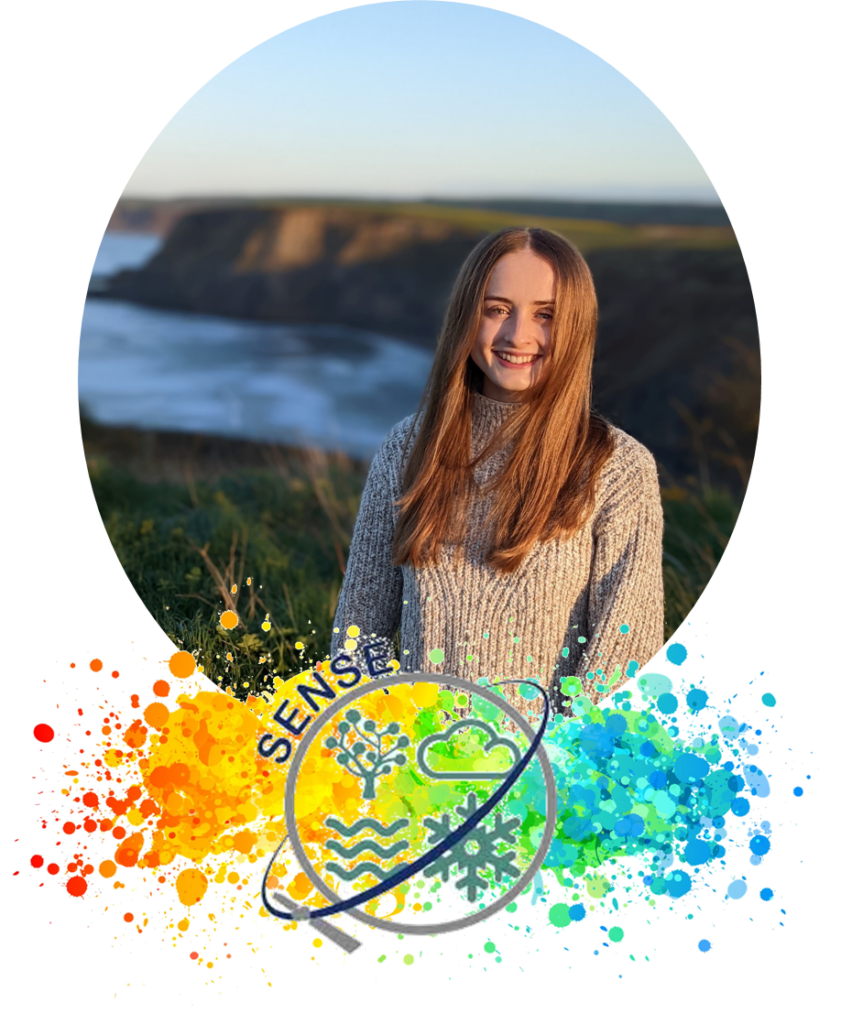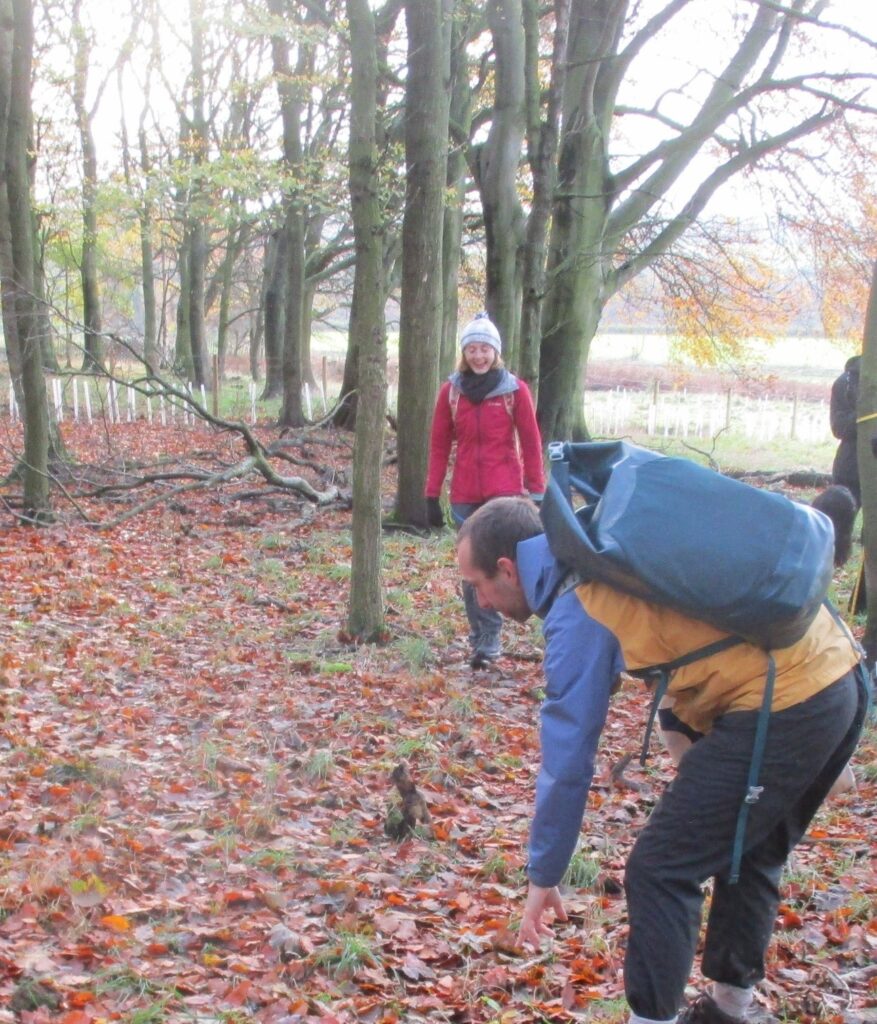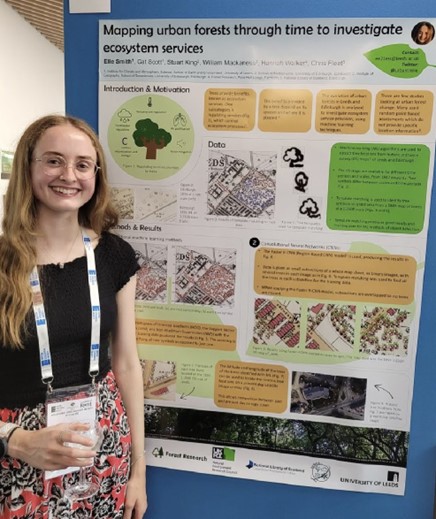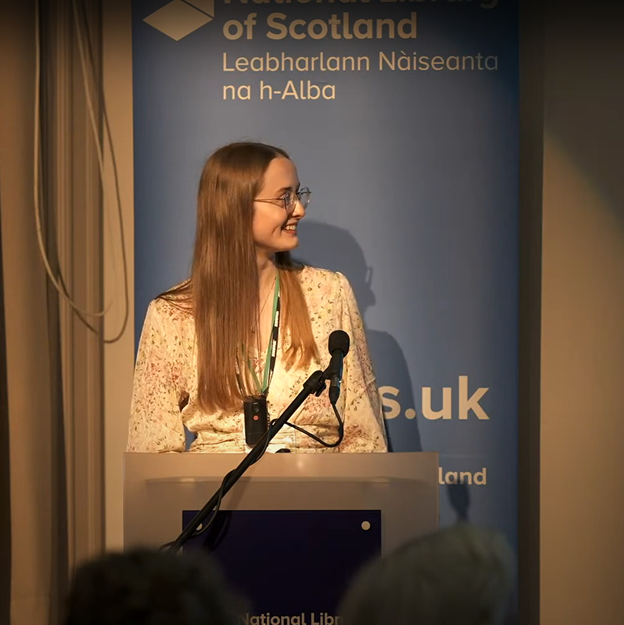Name: Elle Smith
Institution: Institute for Climate and Atmospheric Science, University of Leeds
PhD Project title: Urban Forests through Space and Time

What is your background?
I’m currently in the second year of my PhD, where I’m part of the Biosphere Atmosphere Group at the University of Leeds. My undergraduate degree was in Physics at Durham University where I particularly enjoyed learning how to code with Python. However, it was during my year abroad that I became interested in environmental science. I spent a year studying physics in Paris and took one module which looked at the physics of the weather and atmosphere. This led me to apply for a job as a software developer at the Centre for Environmental Data Analysis (CEDA), which I started after my degree. This combined my two interests: programming and environmental science.
After a couple of years at CEDA I decided I wanted to spend a bit less time on writing software and a bit more time doing some science, so I then completed an MRes in Climate and Atmospheric Science at University of Leeds. During my MRes I discovered an interest in trees which brings me to my PhD!
Despite the module I took in Paris and doing an MRes with atmospheric science in its title, I have very little background in atmospheric science. My module choices were more focused on physical climate change and using numerical methods to investigate climate change. I also did ‘double science’ GCSE and took only Physics to A Level, so I definitely feel lacking in this area. This can create feelings of being an imposter, especially as I am part of the Institute for Climate and Atmospheric Science (ICAS), however my research is relevant and I wouldn’t be there if it wasn’t, which is important to remember.

Tell us about your project and the area of environmental science are you most excited about?
My project investigates the trees in Leeds and Edinburgh (also known as urban forests). I am comparing the location, quantity, and composition of these urban forests between the 1890s and the present day. Doing this comparison allows me to look at the benefits urban trees have provided to these two cities through time, which can inform tree planting plans for the future. To do this I am using historical maps, provided by the National Library of Scotland, to analyse the urban forests of the past and aerial photography datasets for the present day.
The area of environmental science I am most excited about is how trees can contribute to climate change mitigation while also providing other benefits, known as ecosystem services. Urban trees provide benefits across multiple areas which includes supporting biodiversity, being a resource for education, improving mental and physical health and reducing unwanted noise on top of the climate and atmospheric benefits such as carbon sequestration, reducing temperature and removing air pollutants. Forest Research is a great resource for learning more about this.
I have extracted tree symbols from 1890s Ordnance Survey maps of Leeds and Edinburgh using a machine learning method called object detection. This has allowed me to understand how the trees were distributed across these two cities in the past. The next steps in my work will be to investigate various benefits of these trees and how the provision of the benefits has changed through time.

Was using Earth Observation data at the core of your PhD project important to you?
Using Earth Observation (EO) as my part of my PhD wasn’t something I was looking for particularly, but it has opened up a whole new set of possibilities in terms of what I can do with my research project and the skills I have gained through SENSE and how I can use these once I finish my PhD.
EO data is so useful for studying large areas of trees. On the ground surveys are nowhere near as efficient and as a result researchers usually only survey samples of trees to represent the whole area. Combining machine learning with EO data allows each individual tree to be identified and analysed, providing a much more comprehensive study of an area. It also makes this kind of work more accessible as we can study remote areas or areas on the other side of the world without having to leave our desks. Another benefit is that EO data is available for many years into the past, so we are able to examine changes through time without having to have done on the ground surveys each year, which is hugely beneficial – saving on time, money and other resources. I regularly wish that high resolution satellite data was available for the 1890s so I could compare it to the maps that I’m using!

Why did you decide to enter the space sector?
I didn’t set out to be involved in the space sector, but it is definitely a great place to be. My main interest for my PhD was a focus on trees and climate, but I’m so pleased that this is where I’ve ended up. So much of our future research will depend on Earth Observation so it is fantastic to be building skills which will help me with this.
What does equity, diversity and inclusion mean to you?
For me this is about everyone being comfortable being their true self at work, feeling valued and not fearing judgement. This not only applies to office-based work but field trips and teaching positions. It’s also about everyone having equitable access to the same opportunities, which sometimes means providing support to some for areas where others may not need it.
EDI is something that SENSE is constantly working to improve, and this is evident across all the activities that I have been involved with.
What are your hopes for future PhD students?
I’d like to see more opportunities for students to gain experience of what PhD research is like. Many students can’t afford to study at master’s level to get experience of an independent research project so either think a PhD is not for them or go into it not fully understanding what it is that they’re doing. I would hope that opportunities like this, especially if they are paid, would demonstrate to more people that they might enjoy a PhD which would increase diversity.
Any tips for those interested in applying for PhDs?
- Spend some time looking into the topic and really thinking about whether it is something you want to spend 3-4 years working on. Speaking with the project supervisors can really help with this and will demonstrate that you’re thinking seriously about the project.
- If you don’t have a lot of research experience don’t let this put you off, skills from industry, placements and previous degrees are highly valued. However, if you have any doubts that research is right for you, try and gain some experience e.g., a short research placement, to ensure that this is something that you will enjoy.
- Don’t be put off by gaps in your knowledge. A PhD is all about learning new things, so if there’s something you don’t know about, you will be able to pick it up as you go along.



